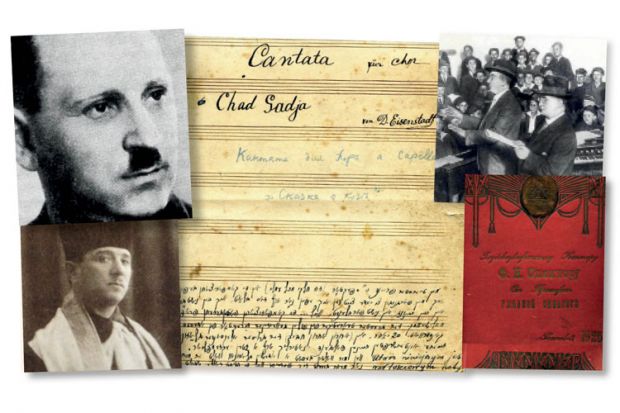More than £1.5 million has been awarded by the Arts and Humanities Research Council to a major project devoted to recovering and performing – and seeking new inspiration from – the lost Jewish music and theatre of pre-war Eastern Europe.
Part of the AHRC’s Care for the Future strand, which aims to generate new understanding of the relationship between the past and the future, Performing the Jewish Archive is led by Stephen Muir, senior lecturer in music at the University of Leeds.
A concert he organised earlier this year gives a sense of what the project should be able to uncover. Dovid Ajzensztadt, a major figure in Polish music in the 1920s, was later sent to the Warsaw ghetto and killed in 1942. Little of his work was believed to have survived. It turned out, however, that he had sought advice from a Russian friend, Froim Spektor, a cantor, and had sent him the manuscript of a Passover cantata for choir.
Since Mr Spektor later emigrated to South Africa, it was there that Dr Muir found the score in a carrier bag of papers put together by his granddaughter. Chad Gadya (One Little Goat) was performed in Leeds this March alongside music by Mr Spektor and in the presence of Mr Spektor’s son. Dr Muir is now also seeking a publisher for the cantata.
The “archive” of Jewish creativity in music and theatre was scattered by the upheavals, persecution and forced migration of the period from 1880 to 1950. Dr Muir and his team now have the resources to try to reassemble this treasure trove, whether it is still hidden in Eastern European attics or as far afield as Australia.
A public talk in Cape Town led to about 20 people coming forward to tell Dr Muir that they had inherited relevant papers from their grandparents – and such “informal archives” are often more at risk than official collections. He compares the whole process to “finding a message in a bottle, washed up on the other side of the world…We’ve opened up a window on to a culture that was destroyed, where so many talented lives were cut short and entire artistic legacies were often destroyed too.”
Along with this “archaeological” role of unearthing and cataloguing artworks, the three-year Performing the Jewish Archive project will generate many articles, at least two monographs and two conferences, and a major online resource.
Literature scholars and musicologists, added Dr Muir, will also be “looking at the archives with a view to how they can be activated via performance”, notably through international festivals at Leeds and York and at partner institutions in Australia, the Czech Republic, South Africa and the US.
The archive will also be used as a spur for new projects. Dr Muir has already worked with students at the Royal College of Music, who were given newly recovered letters, visual material and music to “stimulate their creative juices and encourage them to create new music”.
His colleague Helen Finch, associate professor in German at Leeds, scripted a play, Millions of Kisses, for a youth theatre from the postcards and letters sent between Berlin and London in the early years of the Second World War by a separated Jewish family.
Register to continue
Why register?
- Registration is free and only takes a moment
- Once registered, you can read 3 articles a month
- Sign up for our newsletter
Subscribe
Or subscribe for unlimited access to:
- Unlimited access to news, views, insights & reviews
- Digital editions
- Digital access to THE’s university and college rankings analysis
Already registered or a current subscriber?





